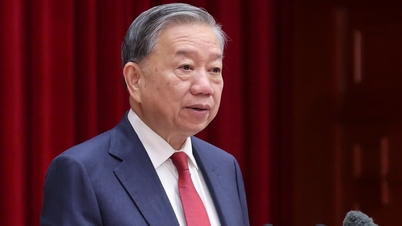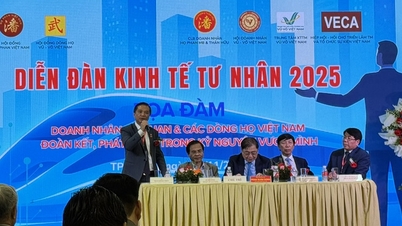In an interview with Vietnam Law Newspaper, Economic Expert - Dr. Nguyen Tri Hieu and Mr. Nguyen Xuan Luc - Vice President of the Vietnam Young Entrepreneurs Investment and Startup Club, Member of the Executive Committee of the Ho Chi Minh City Young Entrepreneurs Association, Chairman of WATATECH Technology Company - shared multi-dimensional perspectives on the opportunities, challenges and breakthrough solutions that create a launching pad for the Vietnamese private economy to thrive in the new era.
Economist - Dr. Nguyen Tri Hieu: For the private sector to make a breakthrough, a stable and transparent legal environment is needed.
Economic expert - Dr. Nguyen Tri Hieu: "Let the private economy develop according to its capacity, don't let it be pushed back by state-owned enterprises"
PV: Doctor, how do you evaluate the current development status of the private economy, especially in the context that we are aiming to become a solid pillar of the national economy?
Dr. Nguyen Tri Hieu: I assess that the Vietnamese private economy has achieved many remarkable achievements when contributing 40% of GDP, creating 85% of jobs (by 2024) and having more than 900,000 operating enterprises (according to VCCI). However, to become a solid pillar, this sector still has three major barriers: unstable legal environment, difficulties in accessing capital and limited competitiveness.
PV: Can you share specifically about these three barriers? Is it possible that this is the reason why the private economic sector has not really "taken off" despite many preferential policies?
Dr. Nguyen Tri Hieu: Exactly, first we need to look straight at the three major barriers that still exist, which are:
Firstly, the unstable legal environment causes many businesses, especially in the textile, agricultural processing and technology industries, to face complicated administrative procedures, increasing operating costs by 15%.
Second, access to capital is limited, with only 20% of small businesses receiving loans at interest rates below 8%, hindering production expansion or technological innovation.
Third, weak competitiveness, with 90% of enterprises being micro, lacking high-quality human resources and modern technology, makes it difficult for them to compete with countries like Thailand, where the private sector contributes 55% of exports. Korea has addressed similar issues through KOTRA (Korea Trade Promotion Agency), supporting enterprises to access technology and markets, achieving 15% annual growth. Vietnam needs to simplify procedures, establish preferential credit funds and invest in training.
PV: So where does this barrier come from? According to you?
Dr. Nguyen Tri Hieu: In my opinion, the thinking of developing a market economy in Vietnam is still not comprehensive when it still considers the private sector as only a supporting force, so priorities in terms of capital or land are often given to state-owned enterprises.
In reality, Vietnamese enterprises do not have real freedom of business, and are still governed by many principles and regulations. In addition, the legal system is overlapping and contradictory, and administrative procedures are complicated, making it easy to encounter risks because of complying with one law but possibly violating another. The issue of policy implementation is still lacking in synchronization between the Central and local levels, causing stagnation in the development of this sector in the overall picture.
Economist - Dr. Nguyen Tri Hieu: "Vietnam needs to change its mindset, put the private sector at the center, amend outdated regulations and build a mechanism to monitor implementation, aiming for the goal of 2 million enterprises by 2030"
PV: Many private enterprises have difficulty accessing resources such as capital, technology, land and high-quality human resources. In your opinion, what breakthrough mechanism do we need to design to remove this "bottleneck", especially in accessing credit and technology transfer?
Dr. Nguyen Tri Hieu: Private enterprises, especially in agriculture and technology, face great difficulties in accessing resources. According to VCCI, only 15% of small enterprises can borrow capital at interest rates below 8% in 2024, and 80% depend on imported technology, reducing competitiveness. To solve this problem, two breakthrough mechanisms are needed.
First, in terms of credit, it is necessary to establish a Credit Guarantee Fund for Small and Medium Enterprises (SMEs) run by the Central Government with a budget of VND10,000 billion, guaranteeing loans from VND100 million to VND1 billion, supporting interest rates, and not requiring collateral. This fund will help agricultural enterprises increase export output by 15-20%, similar to the way some food enterprises have expanded thanks to preferential capital.
Second, in terms of technology, it is necessary to build a National Technology Transfer Center to cooperate with organizations such as JETRO (Japan External Trade Organization) to transfer green and digital technology, supporting businesses to upgrade production each year to reduce import dependence by up to 30%.
PV: The roadmap is already there, but in your opinion, what key factors need to be improved immediately to truly "give the private economy wings", not just stop at paving the way?
Dr. Nguyen Tri Hieu: I think that for the private economy to truly make a breakthrough, the institution needs to focus on the following key factors:
Firstly, simplifying legal regulations, reducing 50% of administrative procedures, as recommended by the World Bank and other international organizations, helps businesses save 20% of costs. In the agricultural and aquatic product export industry, complicated customs procedures take businesses months to complete, reducing competitiveness.
Second, increase asset transparency and fight corruption, following the model from ICAC (Independent Commission Against Corruption Hong Kong), reducing legal risks by 30%. Transparency will attract international investment.
Third, build a public-private dialogue mechanism through economic forums called Private Economic Forums, soliciting opinions from businesses to adjust and perfect policies closer to reality.
In addition, in terms of education , it is necessary to organize 4.0 Entrepreneur Training Programs, cooperate with experienced international organizations such as WEF (World Economic Forum), equipping entrepreneurs with knowledge of digital technology and global governance. In terms of finance, expand the Enterprise Development Fund, prepare capital of about 1 billion USD to invest in businesses, prioritizing green technology and export. This fund will support renewable energy businesses with the goal of increasing exports by 20% thanks to 4% interest capital. Especially in terms of law, a Commercial Court should be established to help handle commercial disputes within 30 days, reducing legal risks by 25%.
Mr. Nguyen Xuan Luc - Technology startups need a safe testing environment
Mr. Nguyen Xuan Luc - Vice President of the Vietnam Young Entrepreneurs Investment and Startup Club, Member of the Executive Committee of the Ho Chi Minh City Young Entrepreneurs Association, Chairman of WATATECH Technology Company: "Resolution 68 is not only a guideline, but must become a real and long-term launching pad for the desire for innovation and creativity"
PV: Sir, how do you perceive the significance of Resolution 68-NQ/TW for the private economic sector - especially the group of innovative enterprises and technology startups?
Mr. Nguyen Xuan Luc: Resolution 68 is a strategic turning point, placing the private economic sector at the center of the country's economic development for the first time. For technology enterprises and startups, the resolution not only expands the policy space but also changes the approach - turning enterprises from "beneficiaries" into "co-creators" of policies. Policies on developing high-quality human resources, public-private partnerships and applying digital technology , AI, and big data are all very timely.
PV: In reality, the startup community still faces many difficulties. What do you see as the biggest obstacle?
Mr. Nguyen Xuan Luc: The biggest barriers today are the difficulty in accessing capital - domestic venture capital funds are limited, while the process and procedures for accessing traditional credit loans are not suitable for startups. Next is the lack of a clear legal corridor - for example, regulations on sandboxes for new products (AI, blockchain, fintech, etc.), or tax policies that are not flexible enough for innovative businesses. In addition, state resources and the actual needs of businesses are still not effectively connected, leading to many policies that, although on paper, do not really "touch" the needs. However, it can be seen that Resolution 68 has proposed specific solutions such as perfecting the institutional framework, developing a legal sandbox, and promoting public-private partnerships to remove these bottlenecks.
PV: Can you share a practical example showing that Resolution 68 is bringing a “new source of inspiration” to the technology startup community – those who are in dire need of both motivation and confidence to embark on this challenging journey?
Mr. Nguyen Xuan Luc: In Ho Chi Minh City and Da Nang, startup support programs, local startup investment funds, and innovation centers are being vigorously implemented. Typically, our business – WATATECH – also received support in testing AI models in urban management. This is a very positive signal, showing that Resolution 68 is gradually coming into practice.
Mr. Nguyen Xuan Luc - Vice President of the Vietnam Young Entrepreneurs Investment and Startup Club, Member of the Executive Committee of the Ho Chi Minh City Young Entrepreneurs Association, Chairman of WATATECH Technology Company: "Technology startups need a safe testing mechanism"
PV: As the person directly managing the startup community, what recommendations do you have?
Mr. Nguyen Xuan Luc: I think that first of all, we need to perfect the legal sandbox framework – allowing technology businesses (AI, blockchain, fintech…) to test new products in a controlled environment. At the same time, there should be more tax and credit incentives for startups – for example, exemption or reduction of corporate income tax in the early stages, or preferential interest rate loans for R&D projects.
Developing local startup investment funds – taking advantage of socialized capital, along with the State’s priority policies. Regarding the human factor, it is necessary to promote the training of high-quality human resources – especially digital transformation skills, financial management, and international market development. Above all, I hope that Resolution 68 will not only be a “compass” but also a solid “launch pad”, helping technology businesses – and especially startups – have a favorable environment to experiment, innovate and reach out not only in Vietnam but also internationally.
New faith and "wings" for aspirations to reach new heights
Looking back at the big picture, it can be seen that the spirit of Resolution 68 has laid a solid foundation and sent a strong signal of commitment from the Party and State to the development of the private economy - the most innovative and flexible force in the integration process. However, as experts and entrepreneurs have pointed out: Paving the way is not enough, but it is necessary to foster trust, remove institutional bottlenecks, improve the legal framework, promote technology transfer, and at the same time create a "safe experimental ecosystem" for bold ideas to be nurtured.
Only then will young businesses and technology startups truly become “leading birds”, daring to take risks, daring to break through and bringing Vietnamese brands high on the global economic map - true to the aspiration that Vietnam will become a high-income country by 2045.
We would like to thank the sharing from Economic Expert - Dr. Nguyen Tri Hieu and Mr. Nguyen Xuan Luc - Vice President of the Vietnam Young Entrepreneurs Investment and Startup Club.
Source: PLVN
View original linkSource: https://baotayninh.vn/chap-doi-canh-cho-kinh-te-tu-nhan-viet-nam-can-co-che-niem-tin-va-khong-gian-but-pha-a191447.html











![[Photo] Cutting hills to make way for people to travel on route 14E that suffered landslides](https://vphoto.vietnam.vn/thumb/1200x675/vietnam/resource/IMAGE/2025/11/08/1762599969318_ndo_br_thiet-ke-chua-co-ten-2025-11-08t154639923-png.webp)









































![[Video] Hue Monuments reopen to welcome visitors](https://vphoto.vietnam.vn/thumb/402x226/vietnam/resource/IMAGE/2025/11/05/1762301089171_dung01-05-43-09still013-jpg.webp)

































































Comment (0)